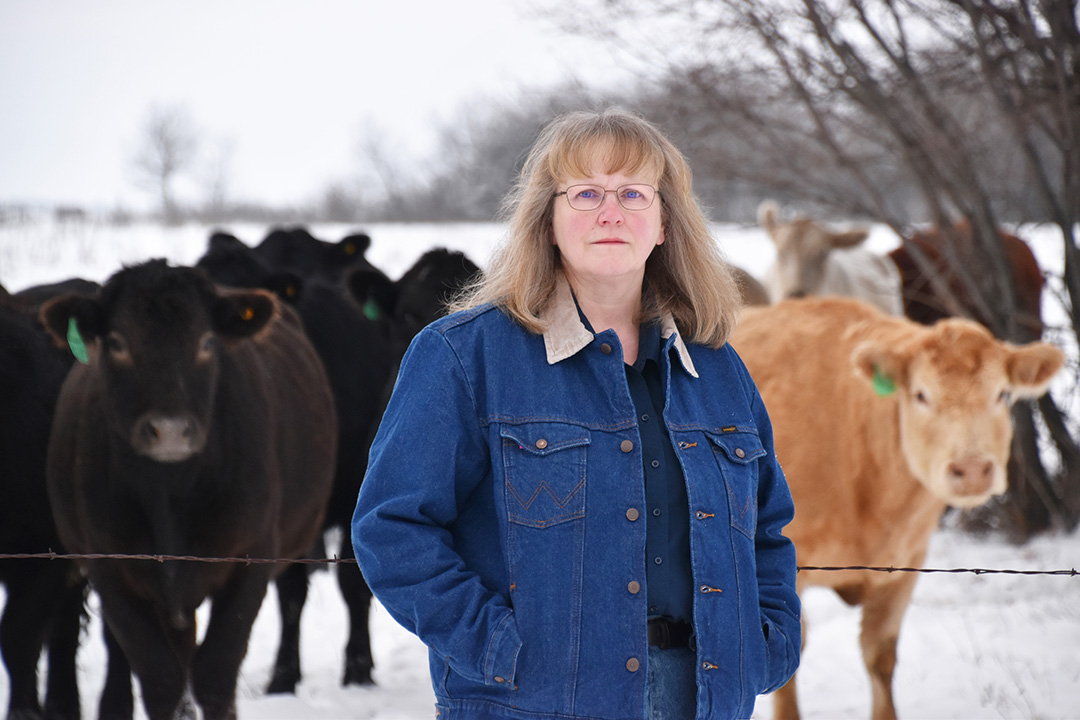
Dr. Cheryl Waldner receives 2024 Canadian Beef Industry Award for Outstanding Research and Innovation
A University of Saskatchewan (USask) leader in beef cattle health and welfare has been awarded the 2024 Canadian Beef Industry Award for Outstanding Research and Innovation.
Dr. Cheryl Waldner, a professor and researcher at the Western College of Veterinary Medicine (WCVM), was honoured at the 2024 Canadian Beef Industry Conference in August 2024.
“Waldner’s work has no doubt improved the competitiveness and sustainability of the Canadian beef industry,” said Craig Lehr, chair of the Beef Cattle Research Council (BCRC) and a beef producer near Medicine Hat, Alta. “Her extensive and proactive efforts while supporting others is greatly admired and appreciated.”
The Canadian Beef Industry Award for Outstanding Research and Innovation is presented annually by the BCRC on behalf of Canada’s beef industry stakeholders. The award recognizes scientists and academics who are actively involved in strong research programs aligned with industry priorities, continually engage with industry stakeholders and demonstrate their passion and long-term commitment through leadership, teamwork and mentorship.
Waldner is the current NSERC/BCRC Industrial Research Chair in One Health and Production-Limiting Diseases. Her work focuses on research in health and productivity of cow-calf herds with a special interest in developing tools for on-farm decisions using new technologies.
“Waldner's ability to translate complex scientific findings into actionable guidance for producers is unparalleled,” said Dr. Stephanie Smith, chief veterinary officer at the Saskatchewan Ministry of Agriculture. “Through her efforts, Waldner has also advanced our understanding of geographical risk factors for mineral deficiencies, providing producers and veterinarians with valuable tools to preemptively address potential health issues.”
Waldner’s extensive research has contributed to the development of tools for veterinarians and producers to monitor antimicrobial resistance and identify respiratory viruses and bacteria, including the recent creation of a Johne’s disease testing decision tool to help manage the disease in beef herds.
“Waldner's long-term commitment to leadership, teamwork and mentorship has been instrumental in nurturing the next generation of researchers and industry leaders,” said Dr. Sheryl Gow, veterinary epidemiologist at Public Health Agency of Canada. “Her collaborative approach, coupled with her commitment to excellence and integrity, exemplifies the spirit of innovation and collaboration that is essential for the continued growth and success of the Canadian beef sector.”
Waldner received her Doctor of Veterinary Medicine (DVM) degree in 1988 from the WCVM and her PhD in epidemiology from USask in 1999. Throughout her career, Waldner has delivered more than 100 invited talks at regional, national and international scientific meetings.
“Her ability to successfully attract research funds and the appropriate collegial scientists to assist the study and reporting on industry issues makes Waldner the most significant researcher supporting an overall view of the research needs of Canada’s beef cattle industry,” said Dr. Eugene Janzen, professor emeritus at the University of Calgary Faculty of Veterinary Medicine.
As a researcher, professor and veterinarian, Waldner has more than 270 peer-reviewed publications, has supervised 15 PhD, eight MSc students, four postdoctoral fellows, one MPH thesis student, eight MPH non-thesis students, six research associates and numerous summer students.
“Leadership has many styles, and Waldner’s style is to quietly come alongside,” said Dr. Leigh Rosengren, the Canadian Cattle Association's chief veterinary officer.
“She never seeks accolades, attention or limelight. She works tirelessly on behalf of her students and colleagues and sets an example of exacting professionalism paired with a demanding work ethic. She promotes her student’s successes while downplaying her own.”
